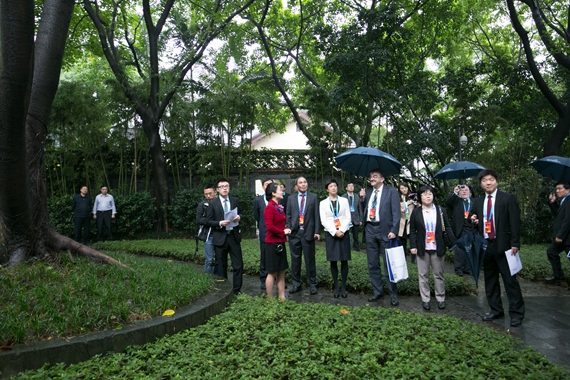Delegates visit CPC Chongqing municipal committee
 0 Comment(s)
0 Comment(s) Print
Print E-mail China.org.cn, October 19, 2016
E-mail China.org.cn, October 19, 2016
|
Delegates for the CPC in Dialogue with the World 2016 visit the CPC Chongqing municipal committee on Oct. 15. |
Oct. 15 dawned foggy and drizzly; yet, this did not dent the enthusiasm of a group of Chinese and foreign politicians and scholars who visited the Communist Party of China (CPC) Chongqing Municipal Committee.
The visit, arranged by the International Department of the CPC Central Committee as part of the annual CPC in Dialogue with the World, was the first time the delegates had a chance to visit the workplace of a provincial-level CPC committee. Previous visits had been to China's ministry-level departments.
The visit this time was intended to allow the visitors to closely watch the work and practice of the CPC at the provincial/municipal level and how the development concepts of the CPC were translated into policies and practices at local level, according to Guo Yezhou, vice minister of the International Department of the CPC Central Committee.
Inside the Chongqing municipal committee compound, once the site of an important meeting in China's history between Chairman Mao and Chiang Kai-shek, Zhang Guoqing, Chongqing's deputy municipal Party secretary, told the visitors about current conditions in Chongqing and its outlook.
The city, located in southwest China, lies at a critical juncture between the well-developed eastern China and the resource-abundant western region. As the only municipality in western China that directly reports to the central government, Chongqing enjoys great advantages in its development, Zhang said.
According to him, the city's GDP grew by 11% in 2015, ranking first nationally. The city has maintained double digit growth since 2002.
According to Zhang, Chongqing has thoroughly implemented the development concepts proposed by the CPC and has then come up with its own development strategy for five functional zones -- a strategy that identifies the distinctive functions of its diverse sub-districts and balances the demands of the city's huge population, environment, and economic growth.
Noteworthy in the city's remarkable growth is its focus on the manufacturing industry and real economy. The city produces about a third of the world's laptops, whereas the manufacturing industry is having a hard time in much of the rest of the country, and many cities have switched their investment focus to the financial and real estate sectors.
Visiting foreign politicians were impressed with Chongqing's achievement and were eager to learn about its successful experiences. Ignatius Chombo, Secretary of Administration for the Zimbabwe African National Union – Patriotic Front (Zanu PF), said later: "I was quite impressed with the management and administration of this huge city, and I was also impressed by the scientific approach to its management.
"It is also very good for us coming from Africa, to have this opportunity to learn how those practices have succeeded." He also noted that the city's development strategy for its five functional zones was "properly planned" and that the city had taken the issue of environmental protection into serious consideration.
Scholars were equally impressed with Chongqing's development. Professor Wang Shaoguang of the Chinese University of Hong Kong first visited the city in the 1990s, and was amazed to see the city "completely changed" from an underdeveloped hinterland into a vibrant metropolis he found on returning in the early 2000s.
Professor Zhang Weiwei of Fudan University noted that the city had made full use of China's grand strategies and turned itself from a remote inland city into one open to the world, which is exemplified in the massive Chongqing-Xinjiang-Europe Railway that connects the city with the rest of the world.







Go to Forum >>0 Comment(s)